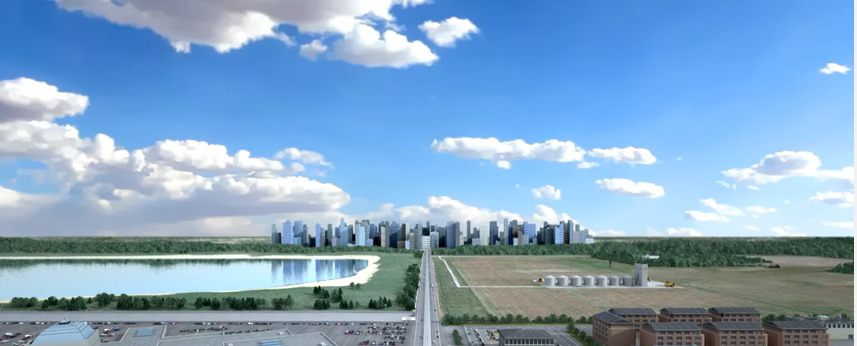Urban Foresight is a “make-the-future happen” consultancy firm focusing on the transformation of cities towards sustainable transport systems and electrical vehicles. The company published “50 big ideas shaping the future on electric mobility”. Tellus Think Tank meets managing director David Beeton to learn more about the ideas that will form the transport systems of the future. By Domi, Tellus ThinkTank
Urban Foresight is one of the first company tenants in Science Central, the largest
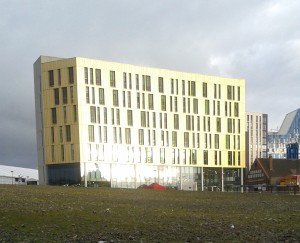
regeneration project in the United Kingdom aiming to move the Newcastle region:
- Towards smart specialisation in business where the region can be comparatively strong.
- To mitigate effects of increased urbanisation, people continuing the move into cities.
- To mitigate effects of global warming, such as floods, storms.
Read further about Newcastle and Science Central in the earlier TellusThinkTank articles:
No007 – Introducing Newcastle upon Tyne – city of sustainability
No008 – The University of Newcastle upon Tyne – innovations hub for sustainability in the urban future
No009 – Science Central – Newcastle upon Tyne laying a golden stepping-stone to the future
What kind of a company is Urban Foresight?
David Beeton was alone when founding Urban Foresight in 2011 and today the team includes over
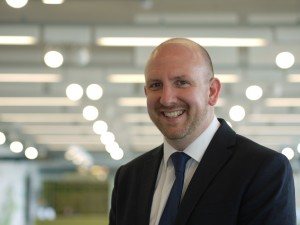
10 employees. It is not by chance that Urban Foresight is one of the first tenants in Science Central, as it seems to be a “make-the-future happen” consultancy firm.
ABOUT TELLUS THINK TANK….read more here
Urban Foresights main focus is on the sustainable transformation of cities, communities, businesses and industry and the company has partnered with a range of different bodies, from Governments, Businesses and NGOs (Non-Governmental Organisations). What I find exciting with Urban Foresight is that they might not be the organisation that gets the public or media credit for implemented changes but they could be very much at the heart of the change.
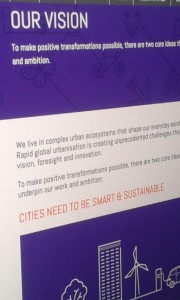
When asking about Urban Foresight’s mission statement, David explains:
-The urban part is recognising that we are all about communities and cities, the foresight part is that communities and cities can be made smarter and more sustainable through strategy, making the right investments and changing business models.
-The people working at Urban Foresight like ideas and looking into the future to try to understand what the transformational business models might be – and we develop strategies. It is first when we introduce the ideas to cities that we make the ideas happen, he says.
David continues to explain Urban Foresight by saying they are not traditional consultants but rather a “consultancy-think-tank”. Many of the projects that Urban Foresight is working with only happened because Urban Foresight have partnered with businesses, NGO’s and governmental agencies, and work a bit “beyond profit”, not expecting immediate income from a project.
Most of the projects aren’t the type that a city would procure because they wouldn’t know where to start. Urban Foresight works with them by supplying “big ideas” and then helping the cities further by building alliances, forming contacts and obtaining funding to turn these ideas into actions.
Cities are continuing to grow – what can be done to mitigate problems with growing cities?
Cities continue to grow as more people are living in urban areas. Today approximately half of the world population lives in cities and according to the WHO (World Health Organisation) 60% will be city dwellers by 2030, rising to 70% by 2050.
The rapid increase in the number of urban inhabitants will be among one of the most
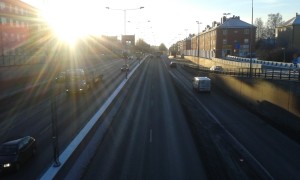
important global health issues of the 21st century. The WHO foresees various problems as a result and declares that air pollutants in particular already are already a of major public health concern. Transport is a significant contributor to air pollution, accounting for nearly one-quarter of global energy-related CO2 emissions.
David tells me that even diesel fuel has been found to be highly dangerous and is now classed as carcinogenic, causing cancer, and placed in the same category as asbestos and mustard gas.
DIESEL IS PLACED IN THE SAME CATEGORY AS ASBESTOS AND MUSTARD GAS
-We cannot afford to not explore electric vehicles, or EV’s as David Beeton calls them.
The future of road transport is not fossil fuel based and there is a consensus in society that we should be transforming to EV’s. However, this transformation will not take place overnight and a lot of infrastructure is still needed for EV’s to work for the general public, he says.
According to David one could drive from Newcastle to London (280 miles / 450 kms) in an electrical vehicle today, and find EV-chargers all the way. The United Kingdom has one of the most extensive rapid charger networks in Europe at the moment only Norway is doing better.
A rapid charger can load 80% of an EV-battery in 20 minutes and can be found at petrol stations along motorways and by shopping malls. People will usually charge their EV at home and 99% of the journeys, to and from work etc, do not need more charging than that!
David says that there is still a need to solve charging possibilities for residents of multi-unit buildings and also to encourage companies to provide chargers in the workplaces for their employees.
-The Science Central employee car park has a couple of chargers, he smiles!
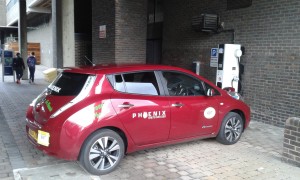
When heading towards this interview I passed through the University of Newcastle area only to find several visible rapid EV-chargers in different locations. I even spotted a Phoenix taxi “charge-parked” by one of them. Phoenix Taxi’s run EV and hybrid vehicles and have the largest low carbon emission fleet in the UK.
Also, all transports to and from the University of Newcastle are channelled to an outskirt warehouse, reloaded to electrical transportation vehicles and then moved to the right location within the University. The University of Newcastle is “walking the talk”!
Check out the TellusThinkTank-article on the University of Newcastle
-The car industry is doing a lot of research in the electrical vehicle area, including hydrogen cars – which is really just a type of electrical vehicle, it stores the energy in hydrogen instead of in a battery, says David.
…WHEN LOOKING AT SMART SYSTEMS FOR FUTURE TRANSPORTS AGENCIES CAN NOT WORK IN ISOLATION BUT NEED TO COOPERATE WITH OTHER PARTIES.
He explains that, one problem, when planning transportation of the future is that different city service agencies work in their own bubbles, “in silos”. When looking at smart systems for future transport agencies can not work in isolation but need to cooperate with other parties.
-The need for cooperation is very apparent when working to increase the use of electrical vehicles and smart transportation systems, says David.
He explains that electrical vehicles, or EV’s as he calls them, start many different conversations naming future transport, future energy, future of public service, behavioural change for travel around the city and the use of energy while doing so.
What kind of projects is Urban Foresight participating in to solve problems with high carbon emissions in cities?
Since a couple of years, Urban Foresight has an office in Belgium in favour of running the European Innovation Partnership on Smart Cities and Communities – organising the collaboration of the 50 organisational members from over 15 countries – that are actively promoting EV’s as an enabler of smart cities.
“The Mill”, Mobility Integration Living Lab, is another interesting project that Urban
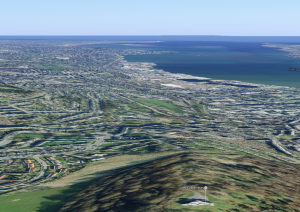
Foresight is involved in, based in the Scottish city of Dundee. Dundee is one of UK’s forerunners in the computer gaming industry residing 10% of UK’s digital studios.
“The Mill”-concept is looking at how to use gamification to encourage people to a more sustainable behaviour. By turning the city into a computer game, expectations are that people would be “incentivized” to act in a more sustainable way.
Instead of banning cars in the city at times of high pollution the city game could incentivize people to take a better route by encouraging them to explore another part of the city. One way could be by rewarding change to the suggested route with local street acting – a concept invented by the National Theatre of Scotland and Abertay University in Dundee.
THE TEV-PROJECT….LOOKING INTO ELECTRICAL HIGHWAYS OF FUTURE TRANSPORT.
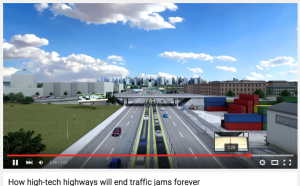
Urban Foresight is also in partnership with the TEV-project – looking into the area of electrical highways of future transportation. It is one of the most interesting ideas I have found so far, when it comes to mid distance future transport. When the driver enters her vehicle into the TEV-system the vehicle goes into central control, which enables convoying of vehicles and allows travel at much higher speeds and safety compared to our current car set-up. The system also has a greater passenger carrying capacity than the current cars-and-roads system. Vehicles would be powered with electricity during the TEV-journey so there would be no limit to how far they can drive without recharging and vehicles will not burn any form of fossil fuel or produce any local emissions.
The TEV-project and partners foresee, pointing at OECD-findings, that passenger transport volume in developed economies will increase with 50% by 2050.
What is Urban Foresight foreseeing?
In daily life Urban Foresight collects inspiration from partners across the globe and pioneering cities that are early in adopting electric vehicles and the needed charging infrastructure, and promote these experiences by producing interesting reads on
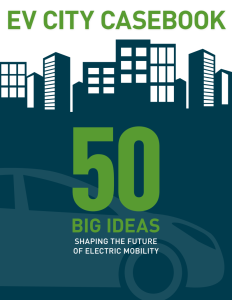
electrical vehicles and electric mobility.
The latest publication, “50 big ideas shaping the future on electric mobility”, holds just what the title promises. Let me comment on the fact that it shows cities all over our globe plugged into the same sustainable song, to mention some ideas:
– Ultra low emission zones (nr 1) – 200 cities in 10 European countries have established Low Emission zones or are preparing to do so – London (UK) is mentioned as a forerunner, already having several schemes in place and more in the planning.
– Transport poverty (nr 4) – Lower fuel and maintenance costs of EV’s provide an opportunity to offer more affordable transport – in 2017 the city of Manila, capital of the Philippines, will be offering 100 000 electric three wheelers (e-trikes) to low paid taxi drivers with a very affordable financing model – reducing millions of tons of CO2 emissions annually.
– EV Vending Machines (nr 31) – Electrical vehicles don’t solve congestion and parking but new car sharing models are being developed. In Chinese Hangzhou users are offered to hire fully charged electrical vehicle’s, from vending machines. The car range is 75 miles / 120 km’s and it can be dropped off at another station close to the user destination.
The other 47 ideas, that Urban Foresight are writing about, are also already bringing the world forward to lower emissions from transport. With so many interesting and impressive initiatives already on the roll, one could say that the world already is our living lab of the future!
This all brings me to wonder what my own city of Stockholm is doing on the electrical vehicle front. I am guessing you are asking the same question about your community?
I thank David Beeton and for taking his time with TellusThinkTank readers this beautiful sunny October morning and head out for a brisk walk through the lovely city of Newcastle upon Tyne!
Next week: We get the opportunity to visit the secret gardens in the densely populated community of Leight, Edinburgh! Join our newsletter and we will let you know when the article is available!
